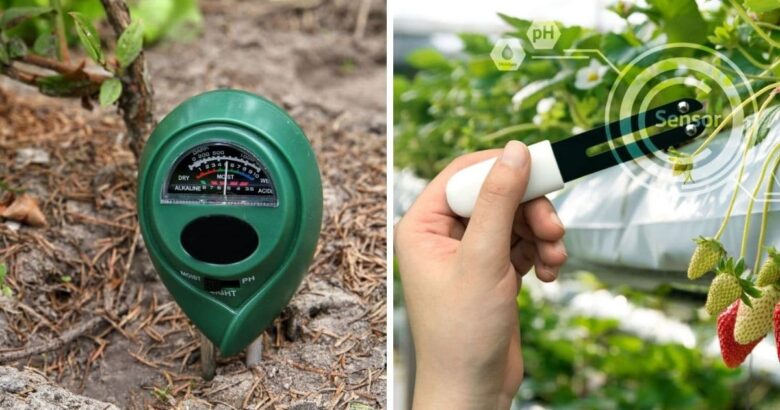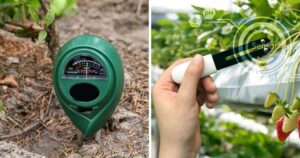To keep your garden healthy, you first need to understand what soil it grows in best. Testing your soil is an important part of ensuring your plants get the nutrients they need to grow well. In recent years, soil test kits have become a popular way for gardeners to quickly learn about the health of their soil. This complete guide covers why soil testing is important, what the most important components of soil are, and some of the best soil testing kits on the market.
1. Importance of Soil Testing:
- Nutrient levels: Nitrogen, phosphorus, and potassium are the most important nutrients in the soil for plant growth. By testing the soil, a gardener can find out what nutrients are already in the soil and decide how much fertilizer to use to replenish any nutrient deficiencies.
- pH: The pH of your soil is a key factor in nutrient availability. Because different plants grow better in different pH ranges, gardeners can vary the pH to create the best conditions for the plants they want to grow.
- Soil composition: Testing soil can provide information about its structure and texture, as well as its composition. Understanding soil composition helps manage water, air movement, and overall soil health.
- Avoid over-fertilization: Using too much fertilizer can be harmful to your plants and the environment. Soil testing helps prevent plants from getting too much food by allowing the gardener to adjust the amount of fertilizer the soil needs.
2. Materials that Make up the Bottom:
- Organic matter: Organic matter in the soil consists of dead plants and animals. It makes the soil stronger, retains moisture better, and makes it easier for plants to absorb nutrients. To understand how fertile your soil is, a soil test kit typically measures the amount of organic matter in it.
- Texture: The amount of sand, silt, and clay particles in a soil is called its texture. Aeration, drainage, and nutrient retention are all affected. Understanding its texture can help a gardener choose the right plant and water it.
- pH: The pH of the soil tells you how acidic or alkaline the soil is. Most plants grow best at a slightly acidic to neutral pH value. Gardeners can adjust the soil to suit the needs of their plants by testing the pH.
- Nutrients: Nitrogen (N), phosphorus (P), and potassium (K) are some of the most important nutrients. Soil test kits can measure these nutrients, helping gardeners decide where to apply fertilizer.
3. Using Soil Testing Kits:
- Follow Instructions Carefully: Be sure to carefully follow the instructions that come with each soil test kit. It is very important to follow them strictly to get accurate results. If you do this correctly, the measurements may not be accurate.
- Sampling: Take soil samples from different parts of the garden, especially if different plants grow differently. To ensure accurate analysis, mix the sample thoroughly before testing.
- Interpreting Results: How to read the results: Soil test kits provide you with results in a variety of ways, such as through color changes, numerical values, or online reports. Check the kit’s instructions or website to make sure you understand the results.
- Take action: Based on the test results, take the necessary steps to correct any deficiencies or imbalances in the soil. This may mean changing the pH, adding certain fertilizers, or adding organic matter to the soil.
Conclusion
Purchasing a good soil test kit is a proactive way to ensure that your garden is in good condition. Knowing what’s special about your soil can help you make gardening choices that benefit the health of your plants and protect the environment. Testing your soil regularly and adding the right substances is the key to a healthy, productive garden for many years to come.
FAQs
1. Why is it important to test your garden soil?
Testing your soil is important to understand its nutrients, pH, and composition. It can help gardeners make informed choices about fertilizer, how to change pH, and how to care for the overall health of the soil.
2. What nutrients do soil test kits typically check for?
Important nutrients such as nitrogen (N), phosphorus (P), and potassium (K) are often measured with soil test kits. Depending on their complexity, some kits can also test for other nutrients.
2. What does pH mean for plants? Why is it important to check this?
Soil pH affects the nutrients available to plants. A pH test can help gardeners create the best conditions for the plants they want to grow by showing them which pH range works best for them.
4. Why is organic matter measured in a soil test? What role does it play in the soil?
Organic matter makes the soil stronger, retains moisture better, and is more readily available to plants. When testing soil, measuring the amount of organic matter in it can give us an idea of how fertile the soil is.
5. How often should I test my garden soil?
A good idea is to test the soil once a year. However, if there are noticeable changes in plant health or changes in the soil, more frequent testing may be necessary.
6. Should I use a professional laboratory or can I trust the results of a home soil test kit?
Home soil test kits can give you accurate results if you use them properly. However, if absolute accuracy is required, it is recommended to send the sample to a professional laboratory for more thorough analysis.



